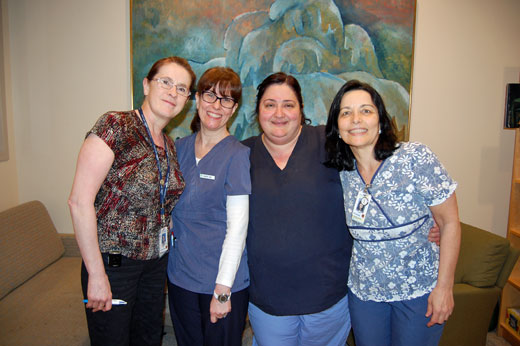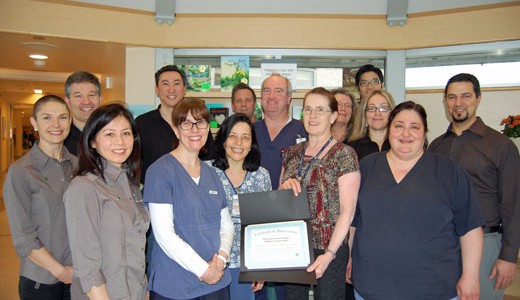Seeing is believing
It happened on the unit. Right there at the patient’s bed. And what Jacqueline Rocheleau saw made her a believer.
“After a patient passes, eye retrievals are conducted while the patient is still in bed,” she says. “I was touched by how respectful they were of the patient. He was treated with dignity — not as a body, but as a mother’s son — and watching the procedure made me feel good about eye donations.”
A patient care coordinator, Jacqueline is just one of many staff on the VGH Palliative Care Unit who refer potential eye donors to the Eye Bank of B.C. In 2013, the team referred 27 donors, the third highest eye donor rate in all of B.C.
“Thanks to their efforts, twenty-seven people regained their sight and so much more,” says Shannon Leonard, donor development liaison with the Eye Bank. “Recipients regained their independence, their ability to drive and they can see the faces of the people they love again — it’s life-altering.”
Donors and families benefit, too

A privilege to work here (l to r): Jacqueline Rocheleau, Laura White, Thikra Abdul-Ahad and Viviane Murilla say it’s a privilege to work in palliative care and help people make end-of-life decisions like eye donation.
Recipients aren’t the only beneficiaries of eye donations. As a health care professional — and as a sister — Jacqueline has seen up close how surviving family members and dying patients benefit, too.
In 2012, tragedy struck Jacqueline’s family. Her brother’s 18-year-old step-son was fatally injured in a car accident. “My brother was devastated,” she recalls, “but I saw how he took comfort in knowing that his step-son would live on through organ donation.”
Surviving family members often express pride in their loved one’s donation, says Viviane Murilla, a palliative care RN. “It adds a little brightness to the family’s life at a difficult time, and it can help people through the grieving process.” Many loved ones share their thoughts and feelings about donation on the Eye Bank’s Facebook page.
And then there are patients who want to leave a legacy. “I remember one particular patient,” says Jacqueline. “He used to donate blood regularly but couldn’t anymore because of chemo treatments, and he missed that. When I explained that he could still make a difference and donate his eyes, he was so pleased. It was important to him to give.”
How you can help give the gift of sight
Altogether, VGH referred a total of 44 eye donors in 2013, but more donors are needed. Almost 400 people across B.C. are waiting for corneal transplants. Most people are candidates for donation—even those with glasses, glaucoma, macular degeneration, diabetes, cataracts and certain types of cancer —but patients and families often don’t know about or understand eye donations. Here’s how you can help:
- Speak to patients and families: A compassionate conversation about organ donation helps patients and families understand their options and find a ray of hope in the future.
- Report all deaths: B.C. law requires all deaths 75 years or younger to be reported to the 24-hour Donor Referral Line at 1-877-366-6722. This step is vital because eyes must be retrieved within eight hours of death.
- Register as a donor: If you want to register yourself as an organ donor, call the B.C. Transplant Society at 604.877.2240 or register online at www.transplant.bc.ca. Advise your family of your wishes to be an organ donor.
Learn more about eye donations at the Eye Bank of British Columbia.


Andrea
Recipients of corneas can show their gratitude by making donor families aware of who received their loved one’s corneas. I would have truly appreciated the story of the person who received my son’s corneas last year, but unfortunately that information iwas not available to me.